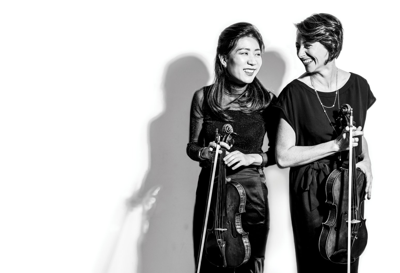This generous program – more than two hours of music on a Monday night! – curated by Marc Gordon showed that popular fare need not be light entertainment. The selections never lacked for tappable rhythms and hummable melodies and the finale was among the most instantly recognizable classical tunes, yet the music was always thought-provoking and constantly surprising. I thought of Charles Chaplin films: entertaining no matter how little you want to think, endlessly absorbing if you are in the mood to think things through.
One of those beautifully intent St. Louis audiences filled the Pillsbury Theatre at 560 Music Center on the west end of the U. City Loop in the shadows of the limestone lion sculptures. Chamber Music Society of St. Louis set out cabaret seating with a cash bar featuring a delicious Old Fashioned and a “Bee-thoven” drink with honey.
The program had no obvious centerpiece, it evolved more like a surprising conversation, so a chronologic narrative makes best sense.
After a Young Artists Prelude with Sophia Heaton (violin) and Brody VanWave (cello) – an inspired idea to challenge young musicians on the concert stage – Brian Woods opened on solo piano playing Soirées de Vienne #6 by Franz Liszt. A playful piece written for amateur musicians to perform at house concerts, it sounded and felt like a good party in the not-too-rowdy early hours.
Woods’ sure hands on piano were then joined by Hannah Ji on violin for Johannes Brahms’ Sonata for Piano and Violin in D Minor, Op 108. After the understandably nervous student musicians and with Woods being captive behind the piano, it was a delight to see Ji dance with her fiddle as she played Brahms’ melodies – now sinuous, now plaintive. Brahms demanded virtuosic chops from both members of the duet, while continually posing the even more difficult challenge of the spare as they both had to stop, hard, then play almost nothing intricately in time before crashing back into form.
After an intermission (try the Old Fashioned), a piano trio – Woods joined by Xiaoxiao Qiang on violin and Ranya Iqbal on cello – played the coolest pair of compositions for piano trio you could ever hope to hear as a sidebar on a concert program.
They played Fritz Kreisler’s Miniature Viennese March for Piano Trio more as a dance than a march, with spry energy in the trio and a walking cello line from Iqbal that did the soul good. They then moved into Johann Nepomuk Hummel’s Piano Trio in G Major, Op. 35 virtually without a pause, and its dynamic twists and nuanced flourishes completed certain thoughts from Kreisler, while painting bright pictures with expressive piano lines that helplessly make one think of Mozart (indeed, Gordon told us Hummel was Mozart’s student at the age of eight). That set the stage for Mozart’s String Quartet # 17 in B-flat Major K. 458.
String Quartet # 17 is quintessential Mozart that inspires an intense longing to binge-watch period costume dramas, the kind you always imagine better than anyone could ever film them. A string quartet of Qiang, Iqbal, Asako Kuboki (violin) and Susan Gordon (viola) played like one complex organism or the interconnected ribs on the bellows of an accordion. And what a performance of propulsive lyrical writing for violin! Qiang got in her abdomen workout dancing in her chair as she made Mozart proud.
The string quartet then hung around for a kind of postlude, J. Strauss, Jr.’s Blue Danube Waltz (arranged by Matt Naughtin), one of those pieces of music that you have heard many, many times yet probably never heard performed on a concert stage. This performance was all about making Blue Danube Waltz thrilling again. Qiang attacked some of the world’s most overplayed melodies like she had heard them for the first time at the first rehearsal two days ago and was performing them live now for the first time ever. That took a special kind of love for playing music and belief in music’s endless capacity to surprise us. I will never forget it.



















(0) comments
Welcome to the discussion.
Log In
Keep it Clean. Please avoid obscene, vulgar, lewd, racist or sexually-oriented language.
PLEASE TURN OFF YOUR CAPS LOCK.
Don't Threaten. Threats of harming another person will not be tolerated.
Be Truthful. Don't knowingly lie about anyone or anything.
Be Nice. No racism, sexism or any sort of -ism that is degrading to another person.
Be Proactive. Use the 'Report' link on each comment to let us know of abusive posts.
Share with Us. We'd love to hear eyewitness accounts, the history behind an article.